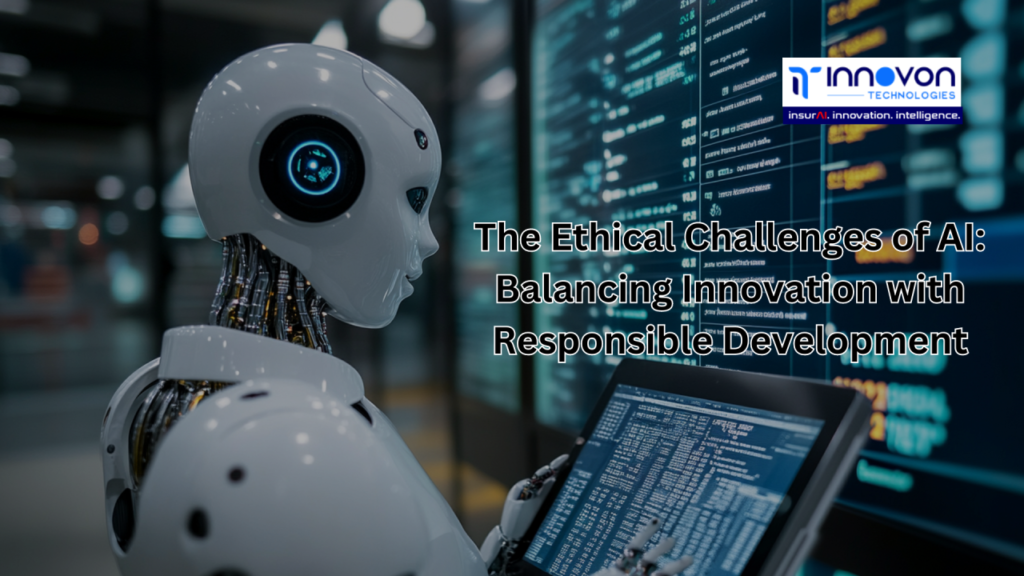At Innovon.AI Technologies, we recognize that Artificial Intelligence (AI) has tremendous potential to revolutionize industries and societies. However, this potential also comes with significant ethical challenges. As AI systems advance, it’s increasingly crucial to ensure that innovation is paired with responsible development. In this article, we explore the ethical considerations surrounding AI and the steps needed to promote its safe and inclusive deployment.
1. The Ethical Implications of AI
AI’s ability to process vast amounts of data and automate tasks can lead to transformative insights and technologies. However, this power comes with risks that raise ethical concerns.
a) Bias in AI Algorithms
AI algorithms depend on the data used for training. If this data is biased, either intentionally or unintentionally, AI models may reinforce or exacerbate these biases. For example, facial recognition systems have been criticized for their lower accuracy in identifying people of colour, while biased hiring algorithms may unfairly disadvantage certain demographics.
At Innovon.AI Technologies, we believe developers must ensure that AI systems are trained on diverse, representative datasets and continuously monitor for unintended biases. Transparency in AI decision-making is vital for understanding and addressing these issues.
b) Accountability and Transparency
AI systems, particularly those utilizing machine learning, are often opaque, making it difficult to understand how decisions are made. This lack of transparency is especially concerning in high-stakes fields like healthcare and criminal justice, where AI decisions can significantly impact lives.
For instance, AI diagnostic tools must provide clear, interpretable results, allowing healthcare professionals to understand the rationale behind recommendations. Establishing frameworks for explainable AI (XAI) is essential, as is ensuring that accountability is clear when AI systems make erroneous or harmful decisions.
c) Privacy Concerns
AI relies heavily on data, which raises privacy issues as organizations gather and process personal information without adequate protection or consent. Regulatory frameworks like the General Data Protection Regulation (GDPR) and the California Consumer Privacy Act (CCPA) aim to safeguard user privacy, but global standards are still needed.
At Innovon.AI Technologies, we prioritize privacy by adopting secure data practices, anonymizing sensitive information, and ensuring user consent. Additionally, we adhere to ethical guidelines that respect user privacy and data protection.
2. The Challenge of Ethical AI Governance
Effective ethical AI development requires robust governance frameworks that involve a variety of stakeholders governments, private companies, and civil society organizations to ensure responsible technology use.
a) Global AI Standards and Regulation
Governments worldwide are working to regulate AI technologies. While regulation is necessary to address ethical concerns, it’s vital to strike a balance between fostering innovation and protecting public interests.
International organizations and governments have begun drafting ethical AI guidelines focused on transparency, fairness, and accountability. For example, the European Union has proposed the AI Act, while UNESCO has introduced an ethical framework encouraging member states to prioritize human rights in AI policies.
Achieving effective AI governance requires international collaboration. Because AI technologies cross national boundaries, a global effort is essential for consistent and equitable standards. Organizations like the United Nations could play a pivotal role in this endeavour.
b) Corporate Responsibility
Private companies are crucial to AI development, making corporate responsibility fundamental to ethical practices. At Innovon.AI Technologies, we take proactive steps to embed ethical considerations into our AI projects.
Many tech giants have established AI ethics boards to oversee their initiatives, comprised of both external experts and internal stakeholders. We believe transparency about our AI applications including data collection and processing practices is essential to building trust with users.
3. Balancing Innovation and Ethics in AI
Innovation and ethics can coexist harmoniously. Ethical AI development can enhance innovation by building user trust and ensuring fair outcomes. Here’s how organizations like Innovon Technologies can achieve this balance:
a) Human-Centered AI Development
To ensure AI technologies are both innovative and ethical, developers should adopt a human-centered approach. This involves prioritizing the well-being of individuals affected by AI systems.
Human-centered AI emphasizes transparency, explainability, and alignment with human values, engaging stakeholders in the development process. For instance, AI systems in healthcare should be created alongside medical professionals to ensure alignment with clinical practices.
b) Promoting Ethical AI Research
Investing in ethical AI research is essential for academia, industry, and policymakers. By exploring ethical implications, organizations can mitigate risks while encouraging innovation.
At Innovon.AI Technologies, we focus on areas like fairness-aware machine learning, which aims to identify and reduce biases, and interpretable AI, which enhances transparency. These efforts help us address ethical concerns while advancing AI capabilities.
c) Public Engagement and Education
As AI becomes more prevalent, public engagement and education are critical for responsible use. Governments, educational institutions, and private companies should collaborate to inform the public about AI’s benefits and risks, empowering individuals to make informed decisions.
Engaging the public in discussions on AI ethics can shape policies that reflect societal values. Community forums, online resources, and educational initiatives can raise awareness about the importance of ethical AI development.
4. Conclusion
The ethical challenges of AI are complex, requiring thoughtful approaches to development and governance. At Innovon.AI Technologies, we believe that balancing innovation with responsible AI development is not only an ethical necessity but also crucial for long-term success in the AI landscape.
By addressing issues of bias, accountability, privacy, and fairness, organizations can create AI systems that are both innovative and ethical. Collaboration among governments, companies, and civil society is vital for establishing global standards that promote the responsible use of AI technologies.
As AI continues to evolve, prioritizing ethical considerations will be critical to ensuring that AI benefits all of society while minimizing potential harms. Organizations that embrace ethical AI development, like Innovon.AI Technologies, will be well-positioned to lead the future of AI innovation, building trust with users and driving sustainable growth in an increasingly AI-driven world.





